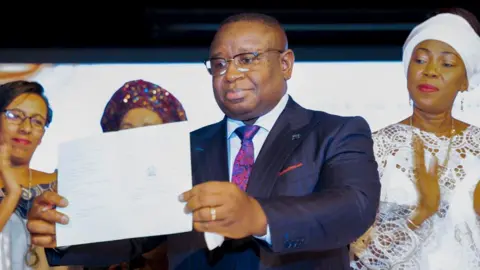Sierra Leone Bans Child Marriage in Celebratory Ceremony
Sierra Leone has introduced a landmark law banning child marriage, celebrated at a grand ceremony in Freetown, organized by First Lady Fatima Bio. Distinguished guests, including first ladies from Cape Verde and Namibia, witnessed President Julius Maada Bio sign the Prohibition of Child Marriage Act into law.
Severe Penalties for Violators
Under the new law, anyone involved in marrying off a girl under 18 will face at least 15 years in prison or a fine of around $4,000 (£3,200), or both. This legislation aims to deter child marriages and protect young girls.
Personal Stories Highlight the Law’s Importance
Khadijatu Barrie, a university student whose sister was married at 14, welcomed the ban but wished it had come sooner. “I really wish it had happened earlier. I could have at least saved my sister and my friends and other neighbors,” the 26-year-old gender studies undergraduate shared.
Challenges in a Patriarchal Society
In Sierra Leone, it is common for fathers to forcefully marry off their daughters. Ms. Barrie herself faced this threat at age 10 but managed to escape with the help of supportive teachers and a UN worker. However, she emphasized the need for widespread awareness of the new law, especially in rural areas.

Aiming to Reduce Maternal Deaths
The health ministry estimates that one-third of girls in Sierra Leone are married before 18, contributing to high maternal death rates. The new law aims to address this by imposing strict penalties on those involved in child marriages, including the groom, parents, and even wedding attendees.
First Lady’s Advocacy
Mrs. Bio has been a vocal advocate against sexual abuse since her husband became president six years ago. She ensured the signing ceremony was a significant event, highlighting the importance of the new legislation.
President’s Commitment to Women’s Empowerment
President Bio, motivated by his upbringing by his mother and elder sister, expressed his dedication to empowering women and girls. “Together, we want to build an empowered Sierra Leone where women are given an even platform to reach their full potential. I have always believed that the future of Sierra Leone is female,” he declared.
Positive Reception from Rights Activists
Rights activists hailed the new law as a watershed moment. The US Bureau of African Affairs also praised the legislation on their X page, calling it a “significant milestone that not only protects girls but promotes robust human rights protections.”


